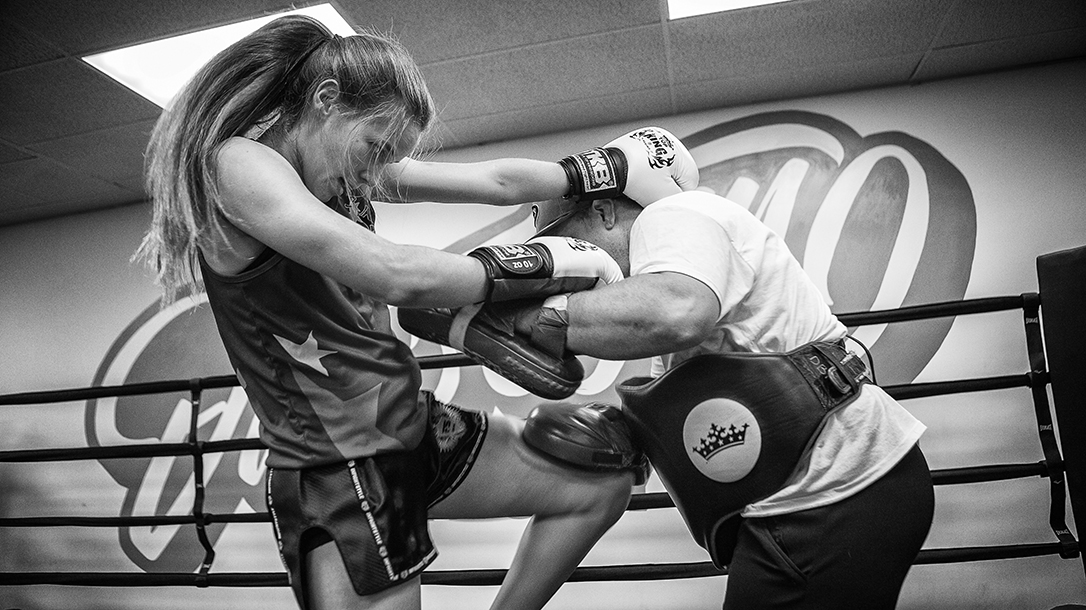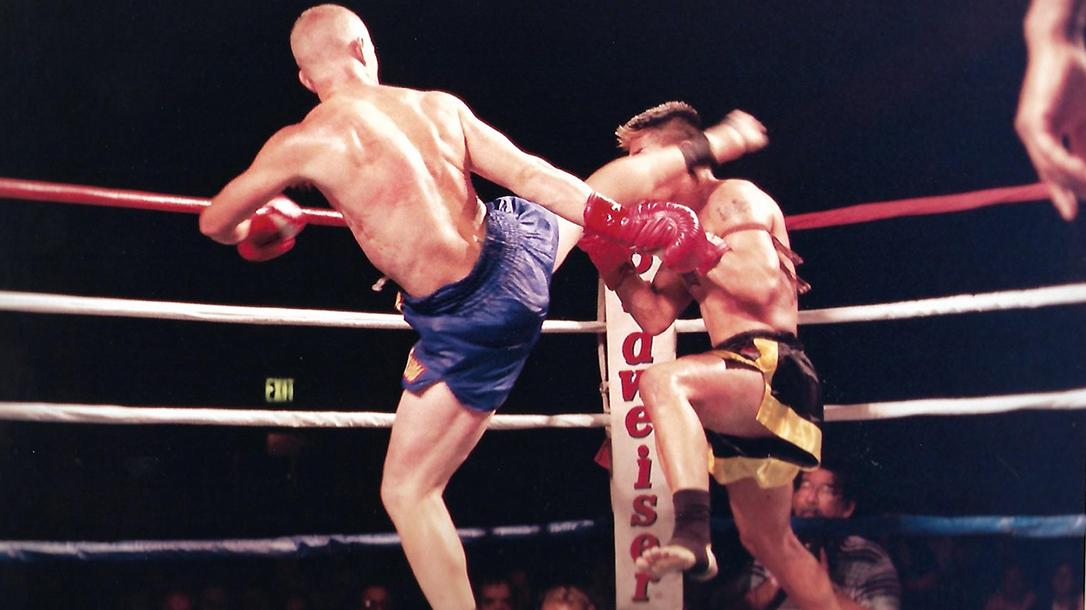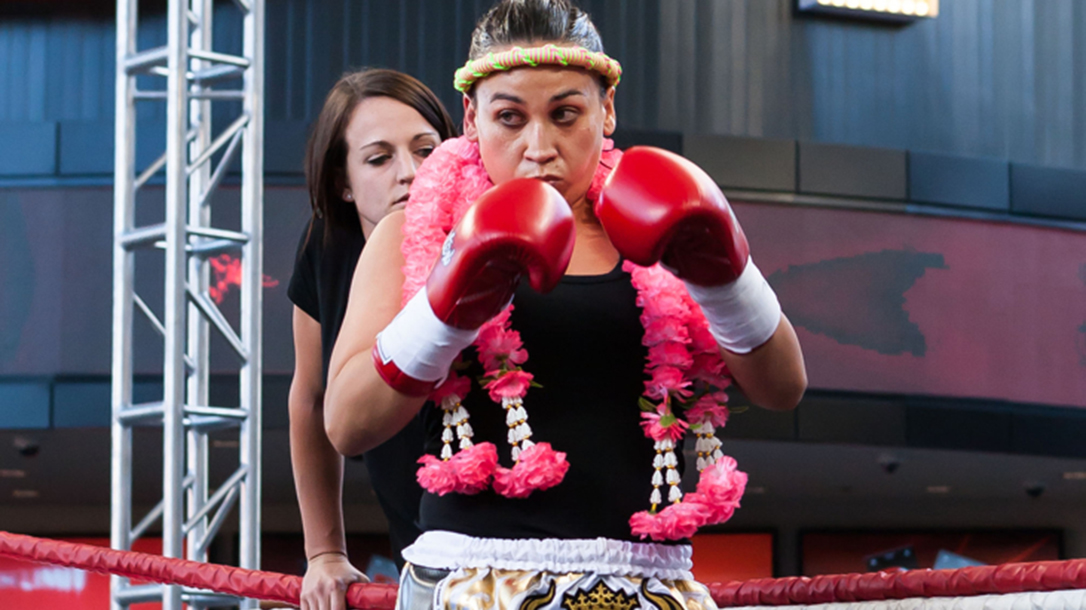While her friends are busy watching movies, posting on social media and chatting about boys and fashion, 16-year-old Tierra Brandt hits the gym for her third workout of the day. On break from school for the holidays, the fresh-faced, ponytailed high school sophomore starts the morning with a cardio session, followed by her varsity team’s soccer practice, strength training and then returns to the gym for both individual and team workouts as a Muay Thai Fighter.
Though she may look every bit like a typical American teen, Tierra Brandt is on her way to becoming a world-class athlete. Already a four-time Muay Thai National Champion and member of Team USA in her age bracket, Brandt has her sights on the international stage, where competition is fierce and the sport enjoys more popularity than it does in the U.S.

I spoke with Brandt as she prepared for her next big challenge: traveling all the way to Thailand, the birthplace of Muay Thai, to fight a ranked Thai opponent in front of a crowd that eats and breathes the sport. Finishing up our conversation upon her return, Brandt gives us the highlights and the lowdown on her first pro-rules/no-pads fight in the Muay Thai mecca of Thailand.
Preparation
Skillset: Tell me about your big fight coming up — where are you going, who are you fighting and how did this all come about?
TB: Basically, the national team picks out a few juniors to compete for the USA team for a one-night show in Thailand. It’s just four kids total, including me, that are going to compete. It will be just one fight, and it will be under professional rules — so, no pads and three or five three-minute rounds. It’s a big one since kids in America compete with full gear and full pads for three two-minute rounds; it’s going to be a big step for us.
Skillset: Oh, wow! So, you’ve never fought a match without pads before? Have you been training without pads, at least?
TB: Nope. This will be the first time. But we’ve been taking baby steps. I mean, just with the adrenaline in the ring, you can’t really feel anything, so I think it will be fine.
Skillset: I know that fighting for you is pretty much in your DNA …
TB: (Laughs.) Yeah, you could say it runs in the family.
All in the Family
Skillset: Tell me a little bit about your family’s background in the sport and how you got started.
TB: Both my parents were fighters. My dad has fought since he was little; he started competing when he was around 12 years old. My mom started fighting before they even met, so I’ve been around it since I was a baby. I was always in the gym, I was always watching. When I was about eight or nine years old, I started really training, focusing on it more. For a long time, my dad wouldn’t let me compete. I was young, and I was his daughter, so he didn’t really want me fighting. I think I was 11 years old when he finally let me have my first fight. And from then on … well, here we are on the national team, competing internationally.
Skillset: Muay Thai is a bigger sport in countries outside the U.S., but is it also popular for women?
TB: It’s obviously more of a male-dominated sport. It is super big in Europe, and Thailand is definitely the most popular place to compete, but it’s very popular in other countries as well. In America, it’s never gotten as big — MMA has kind of taken over here, I guess. Europe and Asia are probably the two biggest places to compete in Muay Thai right now.
Skillset: When you tell people that you fight or when you talk about your sport are people surprised?
TB: (Laughs.) Yeah, just the faces that I get from people when I tell them what I do — it’s always a super big surprise. I hear, “You don’t look like you’d do that,” or “You’re too nice!” But then I get in the ring and it’s all business, you know?
Focus
Skillset: What are you doing to prepare for this upcoming fight? What is your typical day of training?
TB: Right now, since I’m not in school I’ve been training three to four times a day. I am trying to mix in both soccer and Muay Thai at the same time. Usually, I will do cardio in the morning, and then I’ll practice just with my dad in the afternoon. Next, I’ll have soccer practice and sometimes strength and conditioning. Then at night, I have team practice with the rest of our fighters and my dad. So, it’s one long day of constant training. During school, I obviously have to go to school and then right after I have soccer, cardio and a longer Muay Thai training session with my dad and the team.
Skillset: That has to make homework tough. Is it hard to also be a good student?
TB: For sure, time for homework is super squeezed-in, but I am a solid student. My parents are very strict about school, so I have to keep good grades in order to be allowed to train. I always try to stay on top of my studies.
Skillset: You’ve always had your parents as your coaches. Now that you are a teenager, is it ever difficult to be coached by your dad or mom? Do you ever feel as if they’re just “around” too much?
TB: It definitely has its ups and downs. Most people don’t usually have their parents as coaches, so they go to practice and then they get to go home and they’re done with it. But I’m constantly around it. If I’m at home, we’re talking about or watching fights. My dad is so in love with the sport that I never get a break from it. (Laughs.) I guess it could get frustrating, just because they are my parents. They have two different roles to play — they have to switch back and forth from being the parent to being the coach. Actually, they both have been able to balance it pretty well, and it is a good thing, really.
Skillset: Are there any secrets to taking a hit, or is it just something you get used to?
TB: I think it’s about not being afraid. If you’re afraid to get hit or to hit someone else, this sport is pretty much pointless for you. You’ve got to be a little bit of an adrenaline junky — a little bit crazy — to do this sport. (Laughs.) The sport is dangerous in a sense, but it’s also a technical, almost beautiful sport to watch.
The Aftermath
(The following portion of the interview takes place after Tierra’s return from Thailand.)
Skillset: Now that you’re back from your trip to Thailand, which sounds like it was a successful one, tell me about your fight. You came out with a win, but how do you feel you performed?
TB: I felt good. Obviously, it was great to get the win but I felt like I fought well. I was able to stay strong and aggressive throughout the entire fight. Our Team USA fighters did well, too — three out of four of us won our fights, and the girl that lost her fight was fighting the number-one girl in Thailand. She gave her a great fight, and she broke the other girl’s nose, I think.
Skillset: What was it like to compete in Thailand and without pads for the first time?
TB: Fighting without pads was actually better. The pads we usually wear can feel restricting and can affect your range of movement. Without them, I felt like my muscles weren’t as restricted; they were loose and I felt like I moved a lot better. As far as the environment, the crowd was one of the biggest I’ve had for a single fight. It was cool coming out and hearing the noise of the crowd before the fight, all the cheering and people going crazy. After the fight, I had people coming up to me, wanting to take pictures with me. I even had a guy ask me to take a picture with his baby! It was just a really cool fight experience.
Skillset: What was the first thing you did after your win?
TB: (Laughs.) Actually, I went and got a big ice cream. I just wanted something sweet after all that training and eating healthy. It was the best ice cream I think I’ve ever had!
What’s Next
Skillset: Now that you’ve got another international win under your belt, what’s next for Tierra Brandt? What are your goals for 2018?
TB: I’m planning to go back for another fight in Thailand in March, then in May I’ve been invited to compete as one of the junior members of Team USA for the adult Muay Thai World Championships in Cancún. In August, I’ll be going back to the IMFA Youth World Championships in Bangkok. My goals will be to get more international wins and bring home gold medals at the World Championships.
Skillset: What other long-term goals do you have for your fighting career? Where do you see all of this taking you?
TB: Now that Muay Thai is a provisional sport for the Olympics, it means that it will be an official Olympic sport in 2024. I really want to compete in the 2024 Olympic Games in Paris for Team USA. That is my ultimate goal — being in the Olympics.
Follow Tierra on Instagram: @tierra_brandt
The Family That Fights Together
We’re not entirely sure whether Tierra Brandt’s Muay Thai talents — at age 16, she’s already a four-time national champ — are a result of great coaching, great genes or a little (actually, a lot) of both.
We found some answers at Dan’s Gym, the Phoenix-area facility where Brandt trains. The family-owned gym is named after Brandt’s father, former pro fighter and USA National Team trainer Danny Brandt, who also happens to be her coach. He shares coaching duties with Brandt’s mom, Des, who co-owns the gym and is an accomplished amateur fighter in her own right.

Danny started Goju-Ryu karate at age two, Shodokan at age eight, and he racked up an amateur record of 16-3-1 before becoming a professional fighter at age 19. His professional career (with a 6-1 record and high-profile pay-per-view fights) was cut short due to a back injury. Danny would later coach fighters all over the world, and he held a staff position coaching for the USMF Team USA and USA Junior Team. He currently runs his own gym, where he trains fighters of all ages and abilities.
Desiree “Des” (Tierra’s mom) initially took time off from fighting to be a mom to her three young girls. She returned to the gym and to fighting in 2007 to lose some “baby weight.” Not content with losing over 100 pounds, Des would become a champion in multiple weight classes and would earn a spot on the 2012 USMF Team, representing the United States at the IFMA World Championship in St. Petersburg, Russia. She currently coaches alongside her husband.

Des met Danny in the gym in 1997 and trained with him long enough to fight one exhibition fight before becoming pregnant with their first child. They married in the fall of 2000 and have been coaching, fighting, parenting and running their business together ever since, redefining the term “power couple” in the process.
“T-Money” is Tierra Brandt’s nickname given to her by her mom when she was seven years old. (We suppose that if you are going to have a nickname that your mom gave you when you were seven, T-Money is way cooler than anything our moms called us at that age.)
At home, smart, talented and strong-minded females nearly always surround Danny Brandt. In addition to their daughter Tierra, Des and Danny have two other daughters who stay busy in pursuit of things other than Muay Thai, excelling in academics and gymnastics, among other talents.
When they aren’t fighting, in the gym, at tournaments or at their girls’ other activities, this family loves to travel — preferably to a good reggae concert!
To learn more about bad-ass athletes like Tierra Brandt, check out our podcast Skillset Live! Note: This article is from the spring 2018 issue. You can pick up the back issue at OutdoorGroupStore.com!






















